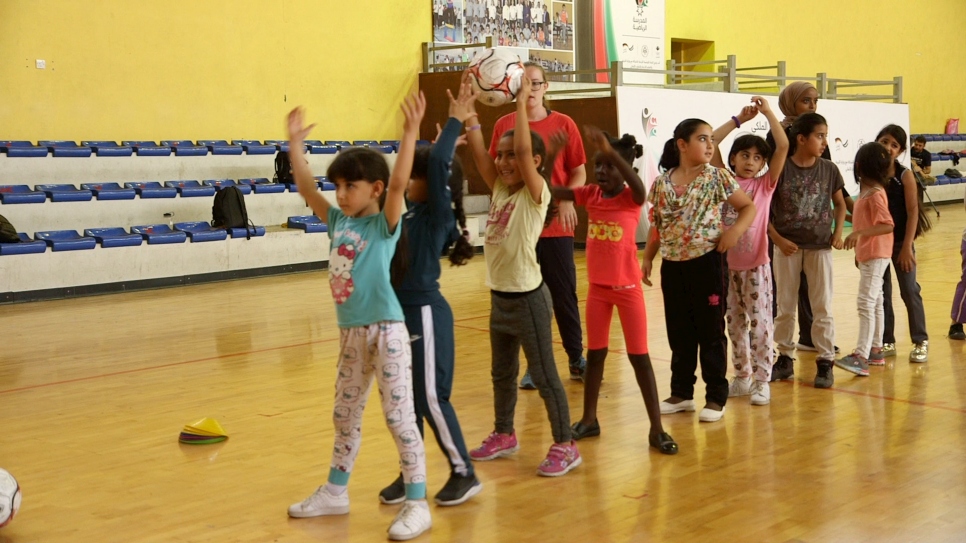Nansen Award finalist gives girls in Jordan a sporting chance
Reclaim Childhood promotes leadership skills and interaction between different refugee and local communities through participation in sport.
When she first arrived in Jordan as a refugee from Sudan five years ago, Waed was painfully shy, refusing to talk to anyone outside her family. Now, sprinting around a basketball court flinging passes and shouting encouragement to her teammates, she says she is unrecognizable from the girl she once was.
“Now I talk to people and interact with them a lot,” 15-year-old Waed said. “I feel like I’m a coach and a leader for my team, and I feel a lot of excitement.
"That excitement is what wakes me up in the morning to come and play and release my energy through basketball.”
Waed attributes her transformation to Reclaim Childhood, a non-profit sports programme for refugee and local girls in Jordan. The programme’s aims are threefold: to provide a safe space for girls to play, to connect different refugee and local communities that may not otherwise interact, and to empower women and girls through participation in sport.
"That excitement is what wakes me up in the morning."
Reclaim Childhood has been selected as one of four regional finalists in this year’s UNHCR Nansen Refugee Award, representing the Middle East and North Africa region. Since its establishment in 1954, the award has recognized individuals and organizations for outstanding work on behalf of forcibly displaced or stateless people.
Each year, Reclaim Childhood works with around 500 girls aged 8 to 18, including refugees from Syria, Palestine, Iraq, Sudan and Somalia as well as local Jordanians. At their two sites in the capital, Amman, and neighbouring Zarqa district, they offer after-school and summer camp courses on a range of sports and activities, including basketball, football and Zumba dance classes.
Jordan is host to nearly 750,000 refugees currently registered with UNHCR, the UN Refugee Agency. Over 80 per cent of them live in urban areas. The overwhelming majority are from the seven-year conflict in neighbouring Syria, but also include significant populations also from Iraq, Yemen, Somalia and Sudan.

Reclaim Childhood, MENA region finalist for the 2018 Nansen Refugee Award (Kathryn Porteous, producer / Shi Han Liu, editor / Reclaim Childhood, videographer)
UNHCR strongly advocates for a “one refugee” approach, in order for all refugees, regardless of their nationality, to have access to equitable protection, assistance and services.
As well as running leadership programmes for the girls, Reclaim Childhood also draws on the communities it serves for its coaching staff. Many of the women who run the courses are themselves refugees, with little or no experience of sports or coaching before they got involved.
Amman head coach Reem Neyaz came to Jordan in 2013 after fleeing the conflict in Syria, and had never worked outside the home until becoming involved with the programme two years ago. She says the experience has changed her personality and her outlook.
“As a refugee, this has taught me to be self-confident and that I should be strong, because when I return to Syria I will have to start over,” she said. “I belong with these girls. We have had the same tragedy, and together we’re moving on step by step and I feel so much better now. I have hope because of this.”
"This has taught me to be self-confident."
Reclaim Childhood’s programme director in Jordan, Jessie Wyatt, describes Reem and the other coaches as being at the core of their approach. As well as running the day-to-day sports activities, the coaches also encourage girls from their local communities to participate and provide a link between parents and the scheme.
“Parents actually have a genuine relationship with the coach,” she explained. “Coaches will make home visits and get to know the families, not only so that the girls can come to the programme, but so that we can help the girls in their outside lives by a process of referrals [to other organizations].”

Soccer practice in Zarqa with members of Reclaim Childhood's "Qudrati" teen leadership development programme. © Reclaim Childhood
“We see a tangible difference from how the girls start versus how they end,” Wyatt added. “By the end they view themselves as leaders, willing to speak in front of groups, willing to take charge, willing to present their own opinions. Our coaches deserve recognition for all the hard work they do to give girls a safe space to play in.”
Before running back on to the court to continue her game, Waed says Reclaim Childhood has made her feel like part of a wider family, while her new-found assertiveness has also had an impact on her own sibling relationships.
“At home, my mom thinks that I’m helping to put my brothers and sisters on the right path,” she said. “They never listened to me before, but now they do whatever I tell them to do.”
Additional reporting by Mohammad Hawari

